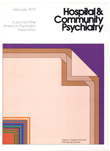The Hospital and Optimal Chemotherapy in Schizophrenia
Abstract
With some schizophrenics, response to antipsychotic drugs is best monitored in the hospital. They include dysphoric responders, those whose illness has been only minimally responsive to antipsychotic drugs, and habitual noncompliers with drug regimen. Dysphoric responses need to be acknowledged and regarded as a danger signal. Patients whose illness is only modestly sensitive to drugs are particularly in danger of psychotoxicity due to excessive dosage. Habitual noncompliers have little investment in staying well, and cannot be expected to bear even mild drug side-effects.
Access content
To read the fulltext, please use one of the options below to sign in or purchase access.- Personal login
- Institutional Login
- Sign in via OpenAthens
- Register for access
-
Please login/register if you wish to pair your device and check access availability.
Not a subscriber?
PsychiatryOnline subscription options offer access to the DSM-5 library, books, journals, CME, and patient resources. This all-in-one virtual library provides psychiatrists and mental health professionals with key resources for diagnosis, treatment, research, and professional development.
Need more help? PsychiatryOnline Customer Service may be reached by emailing [email protected] or by calling 800-368-5777 (in the U.S.) or 703-907-7322 (outside the U.S.).



